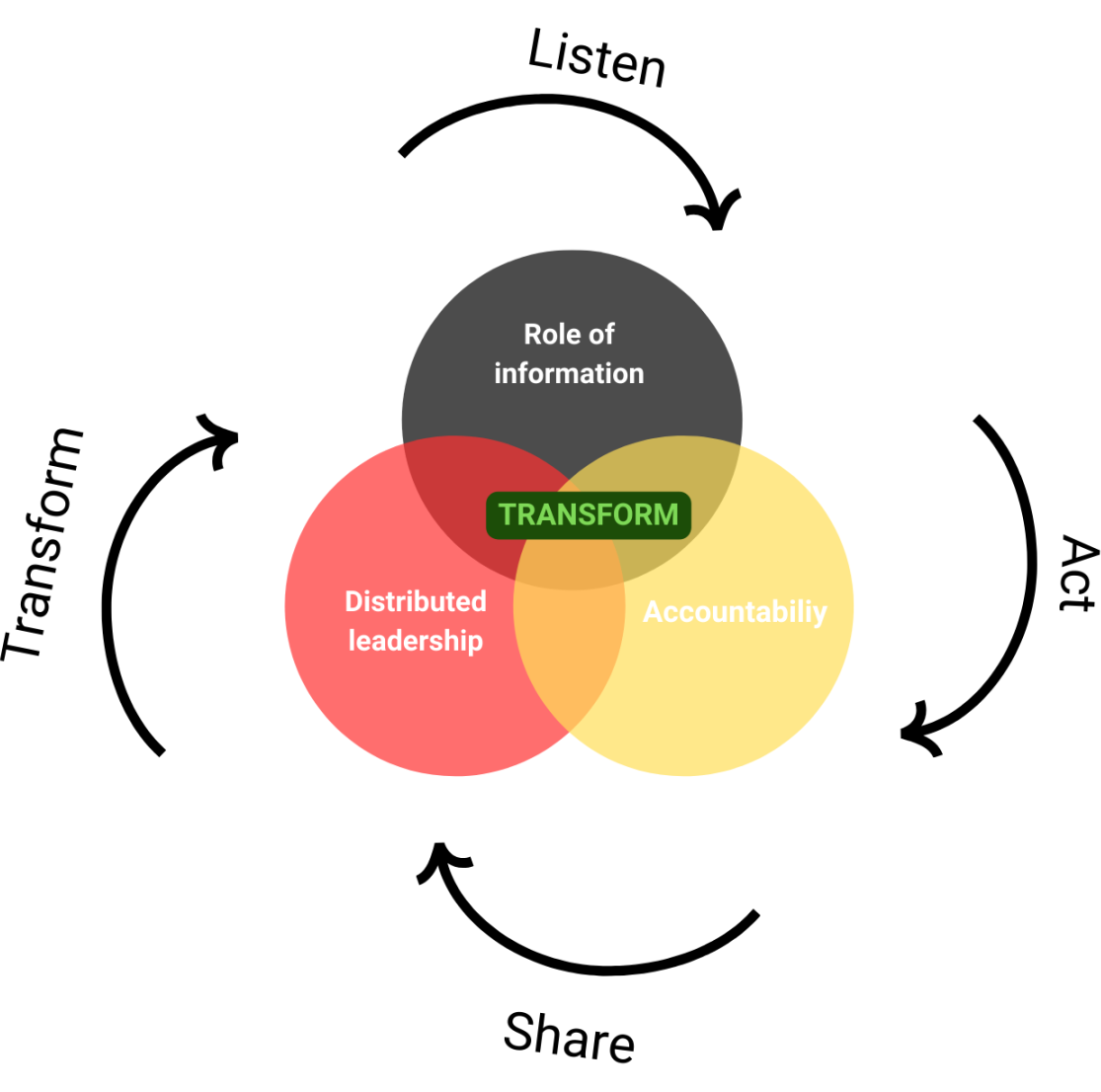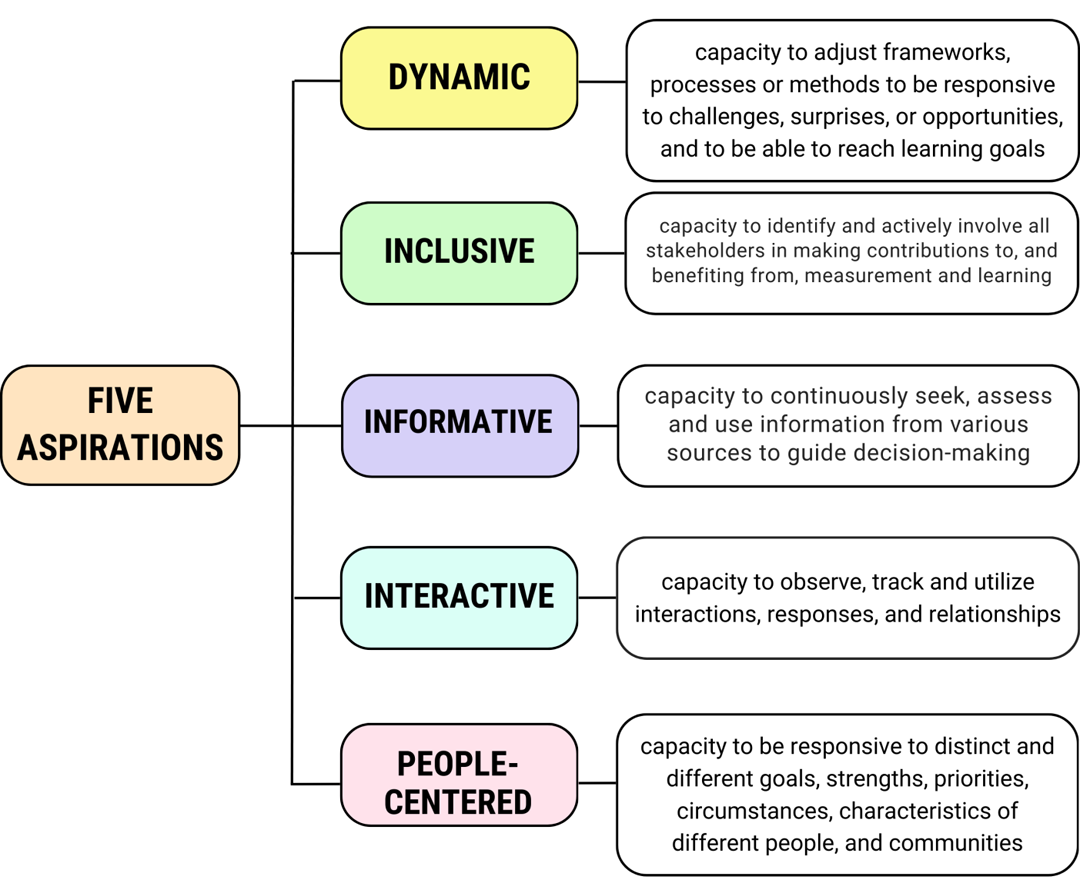About M4C
Explore the mindset, tools and approaches to create a future with courage, precision and compassion.
Use M4C to guide and create impactful interventions at scale
Measurement, evaluation, and learning systems are the catalysts for meaningful change.
Measurement for Change (M4C) stimulates an integrated MEL approach that is rigorous, systematic, but non-prescriptive. This system examines and strengthens the capacity to achieve effective and sustainable change at scale. Initially, it was based on four principles:
- Evidence: All decisions are continuously informed by evidence
- Inclusion: All persons involved in the program should contribute to and benefit from the learning
- Interactive: The measurement process is responsive to the cyclical nature of change
- Heterogeneity: Programs are responsive to individual needs

These principles acknowledge the need for a more holistic, process-based, adaptive, and learning-formed approach to understanding complex human behavior. Complexity requires flexible MEL approaches to meet the challenges of scaling. This awareness deepens our understanding of variability, key mediators and moderators, and the interactions that generate effective decision-making in intervention delivery.
Therefore, M4C creates an awareness of what influences the quality of interventions and clarifies effective pathways to achieving core goals. It can be used to identify what helps or hinders progress and suggests what modifications might increase access and benefits for all.
Clarity of what conditions and individual, social, and physical resources (e.g., human, time, and otherwise) are needed to generate a specific behavioral change or enable a particular target. This can be achieved by giving a central role to three distinct components:
- Role of information
- Distributed leadership
- Strong accountability practices
These three components create an organization that will LAST. But what does LAST mean? An organization that will Listen, Act, Share, and Transform.
The different elements of LAST should not be understood as a linear path. All three elements interrelate and circularly inform each other. This circular cycle creates a "feedback loop" that informs researchers of the consequences of an intervention and this informs sustainability and scalability of interventions. It is the overlapping and interplaying of those elements listed above that allows transformation.

The LAST components are based on a more granular and detailed exploration of the Measurement for Change framework --- the DIIIP. The five DIIP aspirations are embedded into the M4C framework and are pivotal in transforming MEL systems.

"Taken together... it is helpful to view the five aspirations not as a checklist, but a stimulus for reflection in developing MEL systems that truly support the effective delivery of interventions. MEL becomes a constant process of intentional inquiry nudging program implementers to slow down, reflect, and course-correct when necessary, thereby paving the way for meaningful change in the lives of families and communities (de Laat et al., 2023)."
Read more about the aspirations: The Aspirations of Measurement for Change
Visit the Saving Brains website to read more about M4C: https://www.savingbrainslearning.com/m4c-home
Why does this matter?
Integrated MEL systems strengthen the capacity to achieve, effective and sustainable change at scale.
At the core of the M4C approach are five aspirations based on diversity, equity, and inclusion that can guide practitioners and researchers in designing and implementing more effective MEL systems that acknowledge the complexity of human behavior and community needs.
Underlying these five aspirations is a focus on human dignity and a human-rights-centered approach where decision-making is made by all contributors. This means that intervention implementation is informed by common learning. This helps MEL systems to stimulate transformation, meeting the needs of beneficiaries and local communities.
These aspirations serve to expand our thinking on why and how we use measurement - in its many ways and forms. M4C was first applied to the field of Early Childhood Development (ECD), creating effective programs serving families and children. However, M4C can be applied across disciplines and contexts where there is a strong focus on decolonization and indigenization of thought, and effort to localize research.
M4C Timeline

M4C In Action: Learn from our members
Read more: https://usinadaimaginacao.org/
Supported by our members: Kurt Shaw and Rita de Cacia Oenning da Silva.
QUIZ 'Your Understanding'
We made a quiz. Are you participating?

